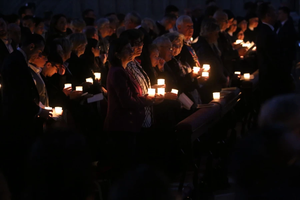The Synod and the Presidential Election — Which Outcome Matters Most?
EDITORIAL: Nothing, including who wins control of the White House for the next four years, can ever be as crucial as our eternal destiny.

A pair of prominent and protracted processes are about to conclude, within just over one week of each other — the multiyear global Synod on Synodality and the 2024 presidential election.
As they wind up, U.S. Catholics ought to reflect on which of these two outcomes is likely to prove the most significant.
The answer is: It depends.
If the Synod on Synodality definitively reshapes the missionary ability of the Catholic Church, either for better or for worse, that will be the more important outcome. That’s because the Church’s divine mission, granted to it nearly 2,000 years ago by Jesus himself, is the salvation of souls. And nothing, including who wins control of the White House for the next four years, can ever be as crucial as our eternal destiny.
Since the start of his papacy, Pope Francis has proclaimed the need for a more synodal Church, one that gives a much greater voice to the laity and listens with greater attentiveness to all of humanity — including estranged Catholics, the adherents of other religions, and those who don’t believe in God at all. Armed by this attentiveness, the Holy Father believes, the Church of the third millennium will be far better equipped to serve as a “field hospital” to today’s confused and hurting world.
That’s certainly an inspirational vision, yet it remains unclear what impact the Synod on Synodality will have on the Church’s core mission. As the four-year formal synodal process draws to a close, widespread uncertainty still prevails regarding what synodality specifically means, let alone whether its implementation can assist meaningfully in evangelization. Hopefully, the upcoming final document will provide some measure of clarity.
Or, it could do just the opposite. Since the Synod on Synodality process was initiated, its central organizational apparatus has been dominated by clergy and lay advisers who appear inclined to open the door to changes in Catholic doctrine in areas like human sexuality and the ordination of women.
If the final document does provide openings for changes in these areas, via the embrace of contentious proposals like the decentralization of doctrinal authority to regional bishops’ conferences, the integrity of Church teaching and potentially even the unity of the Church itself could be at risk. Nothing could be more injurious to its ability to carry out its evangelical witness.
The likeliest outcome, though, is that the result of the synodal process will remain in doubt. For one thing, whatever its final document might state, the Pope retains the final say about whether it has any magisterial authority going forward. For another, the most contentious issues in play at last year’s initial Synod on Synodality assembly were deliberately excluded from this meeting and shunted into the hands of 10 “study groups” that won’t report their findings until 2025.
In light of this ambiguity, the presidential contest might turn out to be far more immediately impactful. Certainly there’s no shortage of major domestic and international issues in play that are of intense concern to Catholics, including abortion, religious liberty, immigration and the wars in the Holy Land, Ukraine and elsewhere.
In each of these areas, highly significant differences are visible between the stances of Republican candidate Donald Trump and his Democratic opponent Kamala Harris. With respect to abortion, Vice President Harris has gone all in for legalizing abortion on demand nationally with no meaningful restraints, whereas former president Trump has expressed strong support for allowing individual states to continue to legislate their own abortion policies, as stipulated in the 2022 Dobbs decision that overturned Roe v. Wade.
On religious liberty, Trump strongly supported pro-life conscience rights during his previous term as president and appears highly likely to do so again should he win a second term. Harris, by contrast, is inextricably associated with President Joe Biden’s record of seeking to suppress the conscience rights of Catholics and other medical professionals who oppose involvement with abortion procedures on the grounds of their faith, and she just doubled down this week stating there would be no “concessions” when asked specifically about religious exemptions.
On immigration, while Harris appears to remain closer to the U.S. bishops’ overall position than Trump, on the campaign trail she has shifted her rhetoric toward support for more restrictive policies in response to the widespread public anger over the lax border enforcement policies that were instituted at the start of the Biden administration. The candidates also differ on their approaches to the Holy Land and Ukraine conflicts, with Trump indicating stronger support for Israel and weaker support for Ukraine than Harris has expressed.
But just as with the outcome of the synod, Catholics need to remember that the verdict on this year’s Election Day doesn’t foretell what will eventually occur in these policy areas, or with the many other issues the next president inevitably will face during his or her term. As always with our messy democratic system of government, there will be numerous unexpected twists and turns along the way.
There’s a powerful lesson here for the faithful, wherever we might stand ecclesially or politically. When it comes to affairs of Church and state alike, our individual mission as followers of Jesus is not to become too attached to any predicted outcomes, nor too dismayed about any apparent setbacks. We should remember that nothing happens in this world that God has not foreseen and permitted.
And, whatever takes place in the short term, in the long run the ultimate outcome is already assured. Courtesy of the death and resurrection of Jesus Christ, God’s loving providence is going to prevail in this life — and in the next.
- Keywords:
- synod on synodality
- elections















